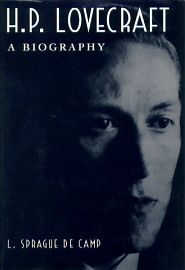Cliff Almas's review
of
H.P. Lovecraft A Biography By L. Sprauge De Camp
Copyright 1975 by L. Sprague De Camp
Edition reviewed published by Barnes & Noble Books 1996
This biography is
exhaustively researched and annotated, yet flawed by some glaring errors
and the distaste the biographer clearly feels for his subject. L. Sprauge
De Camp is best known for a series of ill-considered pastiches and 'posthumous
collaborations' done to flesh out the Robert E. Howard Conan series.
He states quite clearly that his literary preference is for the brawling,
macho, non-too-intellectual adventures of swordsmen and warriors. Nothing
could be more different from the timid antiquarians and tubuculear dilettantes
who people the stories of Lovecraft. When confronted by a slimy, monstrous
elder god risen from the deep, Lovecraft's heroes don't hew them down
with broadswords or even just pistols. They generally faint or go insane.
Right from the beginning of this weighty tome, De Camp draws a link
between the bookish heroes of Lovecraft's stories and Lovecraft himself.
And right from the beginning De Camp confesses to having little patience
for Lovecraft's neuroses, prejudices and almost complete inability to
function as a responsible adult. Although his ambivalence for his subject
does provide a more balanced perspective than the glowing tributes written
by Lovecraft's friends and fans, De Camp's tone of weary contempt begins
to wear after awhile. De Camp exhaustively addresses one of the most
troubling elements of Lovecraft's life and work: his racism, anti-Semitism
and white supremacist views. De Camp shows quite clearly that this is
primarily the result of Lovecraft's bizarre upbringing by parents who
both went insane and ended up in institutions, and later by his elderly
aunts who had a full complement of old New England upper class pretensions
but no money to justify them. Although frequent examples of Lovecraft's
xenophobia and racism can be found in his stories and voluminous correspondence,
it is important to note that his views evolved as he ventured out of
his sheltered home in Providence and actually met some of the people
he was slandering. Ultimately this was a man with friends actively fighting
racism against blacks, Jewish friends, and (briefly) a Jewish wife.
A man who at the end of his life was deeply embarrassed by the dogmatic
ignorance of his youthful opinions. And it is here that we find some
of De Camp's more troubling mistakes and oversights. Although he is
caustic about Lovecraft's racism he is strangely silent about that of
his posthumous bread-earner Robert E. Howard, a frequent correspondent
of Lovecraft. If anything Howard was even more viciously racist than
Lovecraft was. Then there is the baffling mistake made over the death
of magician Harry Houdini, one of Lovecraft's frequent ghostwriting
clients. De Camp states in the text that Houdini died of cancer. This
is odd since every other source states clearly that he died of peritonitis
caused by a ruptured appendix, possibly exasperated by being punched
in the stomach by a Canadian College student. It's a minor enough mistake
but one that casts doubt on every other fact in the book. Lovecraft's
literary strongpoints and failings are carefully and sometimes harshly
appraised. De Camp doesn't have much good to say about Lovecraft's florid
18th century style and the 'adjectivitis' that particularly marred his
early work. De Camp does praise Lovecraft's better stories such as 'A
Color out of Space' and 'The Lurker at the Threshold'. Lovecraft was
a conflicted, contradictory personality and what comes through most
clearly even in this flawed biography is a sense of wasted potential.
Lovecraft wrote to hundreds of correspondents in his lifetime, sometimes
dozens of letters filling as many as forty pages each in the course
of a single week. Although De Camp recognized the inestimable value
to the biographer of the thousands of pages of Lovecraft letters still
in existence, he expresses horror that a working writer would waste
so much time on unpaid writing. It's a point of view that is hard to
dispute. Ultimately Lovecraft was a writer who created a darkly beautiful,
internally consistent universe. A universe that contained the blood
freezing horror of the elder gods and the surreal beauty of the Dreamlands.
His work has inspired such writers as Roger Zelazny, Neil Gaiman, Stephan
King and thousands of others. His influential shadow falls over the
entire horror and fantasy genres.
